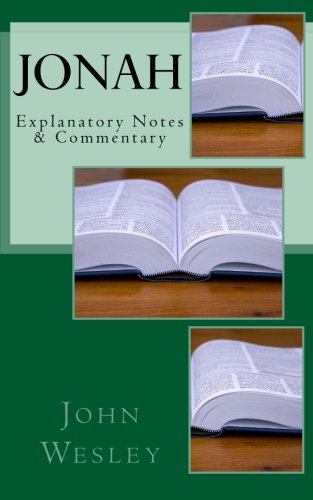Jonah: Explanatory Notes & Commentary, by John Wesley
Jonah: Explanatory Notes & Commentary, By John Wesley. In undertaking this life, many people constantly attempt to do and obtain the best. New knowledge, experience, session, and everything that could improve the life will be done. Nevertheless, numerous individuals occasionally feel confused to obtain those things. Feeling the restricted of experience and sources to be far better is among the lacks to have. However, there is a very easy point that could be done. This is exactly what your instructor consistently manoeuvres you to do this one. Yeah, reading is the solution. Reading an e-book as this Jonah: Explanatory Notes & Commentary, By John Wesley as well as various other referrals could enrich your life quality. Just how can it be?

Jonah: Explanatory Notes & Commentary, by John Wesley

Best PDF Ebook Online Jonah: Explanatory Notes & Commentary, by John Wesley
John Wesley's explanatory notes on the Old Testament were written several years after his notes on the New Testament, and are based on the earlier works of Matthew Henry's 'Exposition of the Old and New Testaments', and Matthew Poole's 'English Annotations on the Holy Bible'. Extracts from both of these works are paraphrased and abridged by Wesley for the Explanatory Notes on the Old Testament, unlike the Explanatory Notes on the New Testament, which were entirely of his own composition.
Jonah: Explanatory Notes & Commentary, by John Wesley- Amazon Sales Rank: #6296461 in Books
- Published on: 2015-06-22
- Original language: English
- Dimensions: 8.00" h x .6" w x 5.00" l,
- Binding: Paperback
- 26 pages

Where to Download Jonah: Explanatory Notes & Commentary, by John Wesley
Most helpful customer reviews
1 of 1 people found the following review helpful. Wesley sees doctinare Christian teachings in Jonah By Israel Drazin John Wesley, an English theologian, was the co-founder with his brother Charles and fellow cleric George Whitefield of the evangelical movement known as the Methodist Church. He was born in 1703 and died in 1791 with his final words being, “The best of all is, God is with us.”While not considered a systematic theologian, he is recognized to have been a logical thinker and a clear and concise writer. He stressed the importance of loving God and felt that grace (an undeserved gift from God) was the way that God “sanctified the believer.” He felt that the Bible was the sole source of the truth because it was the word of God, and he called himself the “man of one book.” He was an abolitionist and spoke out against slavery.He wrote a short book in 1765 called “Jonah: Explanatory Notes and Commentary.” He admits to “being conscious of my very imperfect acquaintance with the Hebrew tongue.” He maintains that Jonah the son of Amittai in this book is the same man as the Jonah son of Amittai in II Kings 14:25 and that he is the author of this book. In II Kings the prophet Jonah tells King Jeroboam ben Joash of Israel (also known as Jeroboam II) that God said to restore the coast of Israel. According to W. F. Albright Jeroboam II ruled for forty years from 786 to 746 BCE. He was the fourteenth king of Israel. This would date the prophet in the mid-eight century BCE.Wesley states “he was a messenger of mercy to Israel in the reign of Jeroboam the second. We (also) have here (in the book of Jonah) a remarkable instance of God’s mercy toward repenting sinners.”Contrary to the New Testament that sees Jonah prefiguring the advent of Jesus and the punishment of Israel, Wesley writes that “every word (is) the oracles of God” and “what runs tho’ the whole work and will much recommend it (is) the doctrine of absolution,” meaning the chance for the removal of sin and the beginning of peace. However, like the New Testament, he adds: “And in Jonah we have a most remarkable type, of our Lord’s burial and resurrection.”He states that the city of Nineveh was eighteen miles and three quarters in length and eleven miles and one quarter in breadth. He explains Jonah’s flight as perhaps Jonah thinking God “would not put upon him this work when he was got into a strange country.” He says that “Lots are an appeal to heaven in doubtful cases,” but should not be used when the matter can be determined in another way. He sees “Jonah’s casting over-board was a type of Christ’s death, so the effect it had upon the mariners might be a type of the conversion of the heathen from idols unto God.” Likewise, he felt that the people of Nineveh converted and believed in God.Why, after obeying God and seeing the conversion of heathens was Jonah distressed? He felt disgraced because he had predicted the city’s destruction and “hardened sinners…will brand me a liar.”
See all 1 customer reviews... Jonah: Explanatory Notes & Commentary, by John WesleyJonah: Explanatory Notes & Commentary, by John Wesley PDF
Jonah: Explanatory Notes & Commentary, by John Wesley iBooks
Jonah: Explanatory Notes & Commentary, by John Wesley ePub
Jonah: Explanatory Notes & Commentary, by John Wesley rtf
Jonah: Explanatory Notes & Commentary, by John Wesley AZW
Jonah: Explanatory Notes & Commentary, by John Wesley Kindle
Tidak ada komentar:
Posting Komentar